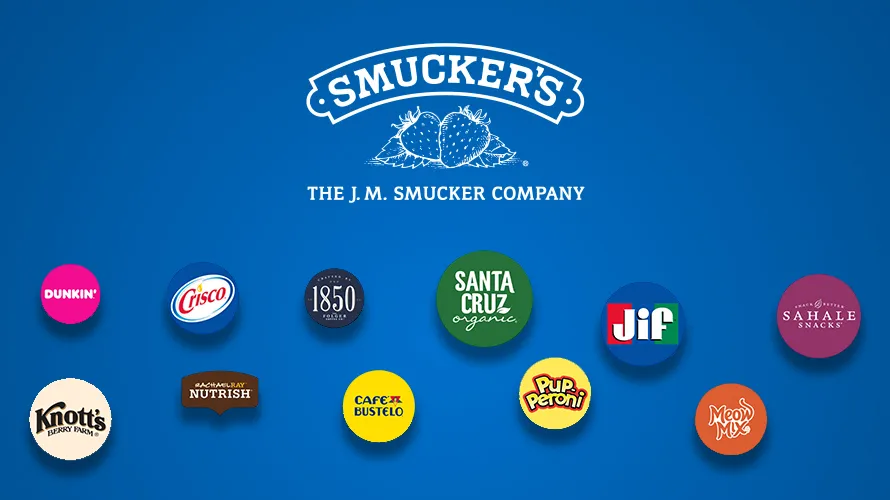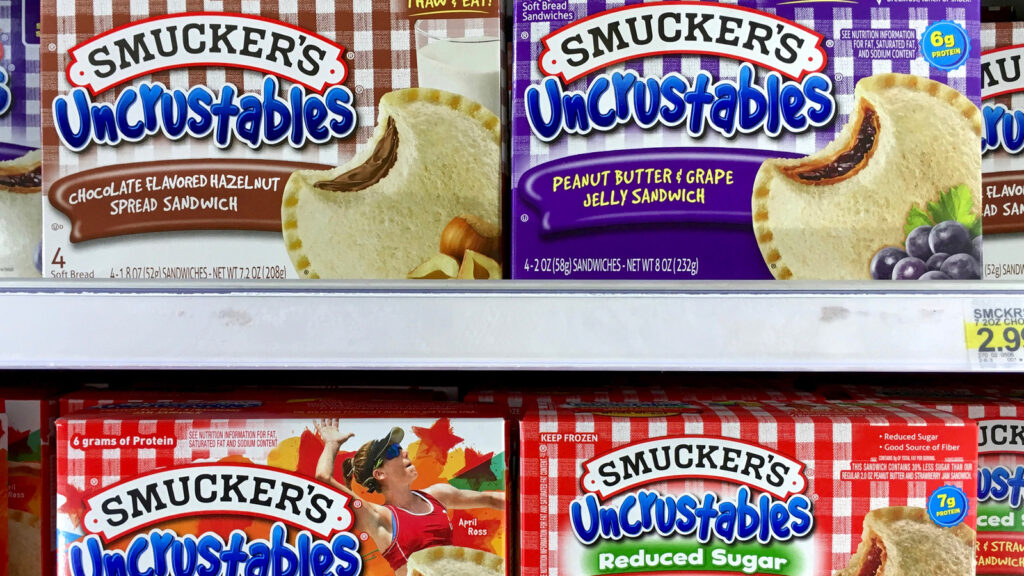The J.M. Smucker Company, commonly known as Smucker’s, is a quintessential American brand with a rich history rooted in quality and tradition. Established in 1897 by Jerome Monroe Smucker in Orrville, Ohio, the company began as a small apple butter business operated from a barn. From these humble beginnings, Smucker’s has grown into a leading global producer of food products, renowned for its wide range of offerings, including jams, jellies, preserves, and various other grocery items. The company’s commitment to quality, innovation, and consumer satisfaction has been key to its enduring success and strong market presence.

Smucker’s origins are deeply tied to its commitment to producing high-quality, homemade-style products. Jerome Smucker started his business by selling apple butter made from locally grown apples, which quickly gained popularity for its superior taste and quality. The brand’s emphasis on using natural ingredients and traditional methods helped establish a reputation for excellence. Over the years, this dedication to quality has remained a core value of the company, guiding its product development and overall brand strategy.
In the early 1900s, Smucker’s began to expand its product line beyond apple butter to include a variety of fruit preserves and jellies. This expansion was driven by a commitment to innovation and meeting consumer demands for new and diverse products. Smucker’s introduced new flavors and formulations, leveraging its expertise in fruit preservation to create a range of products that catered to different tastes and preferences. The brand’s focus on delivering consistent quality and delicious flavors helped it become a household name in the United States.
One of the pivotal moments in Smucker’s history came in the 1980s and 1990s, when the company embarked on a series of strategic acquisitions to broaden its product portfolio and market reach. In 1987, Smucker’s acquired the Jif peanut butter brand, which became a significant addition to its product lineup. This acquisition marked the beginning of a period of growth and diversification for Smucker’s, as it sought to expand beyond its core fruit spreads business. The purchase of Jif allowed Smucker’s to enter the peanut butter market, further establishing its presence in the grocery sector.
The 1990s also saw Smucker’s acquire several other well-known brands, including Crisco, a leading brand of cooking oils and shortenings, and the Pillsbury brand’s frozen dough products. These acquisitions allowed Smucker’s to diversify its product offerings and enter new market segments, solidifying its position as a major player in the food industry. By integrating these established brands into its portfolio, Smucker’s was able to leverage their existing consumer bases and market presence.
In the 2000s and 2010s, Smucker’s continued to grow through additional acquisitions and strategic investments. The company acquired the Dunkin’ Donuts packaged coffee business in 2015, which further expanded its reach in the coffee market. Smucker’s also invested in expanding its distribution capabilities and enhancing its production facilities to support its growing product lines. These strategic moves reflected the company’s commitment to maintaining its leadership position in the food industry and meeting evolving consumer demands.
Smucker’s marketing strategy has played a crucial role in its success, focusing on highlighting the quality and heritage of its products. The brand’s advertising often emphasizes the traditional methods used in its production processes and the natural ingredients used in its recipes. Smucker’s has effectively communicated its values of quality and authenticity through its marketing campaigns, resonating with consumers who value wholesome and reliable food products.
The company has also embraced sustainability and corporate social responsibility as key aspects of its business strategy. Smucker’s has implemented various initiatives aimed at reducing its environmental impact and supporting the communities in which it operates. The company has made significant efforts to improve its sustainability practices, including reducing waste, conserving water, and sourcing ingredients responsibly. Additionally, Smucker’s supports various charitable organizations and community programs, reflecting its commitment to social responsibility.
In recent years, Smucker’s has continued to adapt to changing consumer preferences and market trends. The company has focused on expanding its product offerings to include healthier options and new flavor innovations. Smucker’s has also invested in enhancing its digital presence and e-commerce capabilities to better serve its customers in an increasingly digital marketplace. These efforts demonstrate Smucker’s commitment to staying relevant and meeting the evolving needs of its consumers.
In conclusion, The J.M. Smucker Company has established itself as a leading name in the food industry through its dedication to quality, innovation, and consumer satisfaction. From its origins as a small apple butter business to its current status as a major global food producer, Smucker’s has consistently delivered products that meet high standards of excellence. The company’s strategic acquisitions, effective marketing, and commitment to sustainability have all contributed to its continued success and strong market presence. As Smucker’s looks to the future, it remains focused on maintaining its legacy of quality and adapting to the changing landscape of the food industry.
Marketing Strategies of Smucker’s
The J.M. Smucker Company has crafted a multifaceted marketing strategy to maintain its market leadership and brand prominence. Let’s delve into the detailed marketing strategies employed by Smucker’s:
1. Brand Heritage and Legacy
Smucker’s has effectively leveraged its brand heritage and legacy as a powerful marketing strategy to resonate with both existing and new consumers. By emphasizing its long-standing tradition of quality and family-oriented values, Smucker’s has successfully connected emotionally with its audience. The company’s iconic brands, such as Jif and Folgers, have been revitalized through campaigns that honor their historical significance while appealing to contemporary consumer preferences. For instance, the “That Jif’ing Good” campaign launched in 2019 not only highlighted the brand’s rich history but also integrated modern cultural elements, such as hip-hop, to attract younger demographics.

In addition to revitalizing existing brands, Smucker’s has also introduced new products that pay homage to its heritage. The launch of the 1850 coffee brand is a prime example; it was developed to resonate with millennial consumers by tapping into the entrepreneurial spirit that has defined Folgers since its inception. This strategic move not only honors the company’s past but also aligns with current market trends, demonstrating Smucker’s commitment to innovation rooted in tradition. Furthermore, campaigns like “Father Nature” for Smucker’s Natural Fruit Spreads cleverly incorporate modern parenting themes while maintaining the brand’s core values of natural ingredients and wholesome family connections.
https://www.youtube.com/watch?v=yVTYCmxqkFw
The effectiveness of Smucker’s heritage-focused marketing strategy is evident in its impressive growth metrics. Since implementing a comprehensive marketing overhaul in 2018, nearly 86% of its brands have seen growth or maintained market share, a significant increase from less than a quarter before the initiative.This transformation highlights how embracing brand legacy can lead to renewed consumer interest and loyalty. By continuously weaving its historical narrative into modern campaigns, Smucker’s not only preserves its legacy but also fosters a dynamic relationship with consumers that adapts to changing preferences while remaining grounded in its storied past.
2. Product Diversification
Smucker’s has adeptly employed product diversification as a marketing strategy to enhance its market presence and appeal to a broader consumer base. By expanding its product lines beyond traditional offerings, Smucker’s has successfully tapped into evolving consumer preferences and lifestyle changes. For example, the introduction of Smucker’s Uncrustables Meat and Cheese Bites illustrates this strategy well. Originally known for its frozen peanut butter and jelly sandwiches, the brand has now ventured into savory options that cater to busy families seeking convenient, nutritious meals. This move not only retains existing customers but also attracts new ones looking for quick lunch solutions for children, thus broadening the brand’s appeal in the competitive snack market.

Smucker’s diversification strategy is further exemplified by its recent acquisition of Hostess Brands for $5.6 billion. This strategic acquisition significantly expands Smucker’s portfolio, adding iconic snack brands like Twinkies and HoHos to its lineup. By integrating these beloved products, Smucker’s can leverage established brand loyalty while cross-promoting with its existing offerings, such as coffee and pet food brands. This approach allows Smucker’s to create synergies across its various product lines, enhancing overall sales and market share in the snack food category. Moreover, it positions the company to compete more effectively against other major players in the snack industry.
Additionally, Smucker’s has innovatively expanded its flagship brands through new flavor introductions and product formats. The launch of Jif’s Peanut Butter & Chocolate Flavored Spread is a noteworthy example, merging the classic taste of peanut butter with chocolate to attract consumers who enjoy sweet spreads like Nutella. This product not only caters to current trends but also reinforces Jif’s position as a leader in the peanut butter market with 39% market share. Such innovations demonstrate how Smucker’s is committed to staying relevant by diversifying its offerings while maintaining the quality and brand integrity that consumers expect. Through these strategic initiatives, Smucker’s continues to solidify its presence across multiple food categories, ensuring sustained growth and consumer engagement.
3. Emphasis on Quality and Natural Ingredients
The J.M. Smucker Company has strategically emphasized quality and natural ingredients as a cornerstone of its marketing approach, effectively aligning with consumer demands for healthier and more transparent food options. By prioritizing high-quality ingredients, Smucker’s not only enhances its product offerings but also builds trust with consumers who are increasingly concerned about what goes into their food. For instance, the company has established rigorous quality assurance protocols that begin long before ingredients reach their production facilities. Smucker’s engages in close relationships with farmers and suppliers, ensuring that only the best strawberries, peanuts, and coffee beans are used in their products. This commitment to quality is reflected in their tagline, “With a name you can trust,” reinforcing their long-standing reputation for excellence.
One notable example of Smucker’s dedication to natural ingredients is the launch of its R.W. Knudsen Family brand, which focuses on organic and all-natural beverages. This brand embodies the company’s commitment to health-conscious consumers by offering juices that are free from artificial preservatives and additives. The marketing campaigns for R.W. Knudsen emphasize the purity and authenticity of the ingredients, appealing to consumers who prioritize wellness in their dietary choices. Additionally, Smucker’s has expanded its product lines to include organic versions of its popular jams and jellies, further demonstrating its responsiveness to market trends favoring natural foods.
Moreover, Smucker’s has effectively communicated its quality promise through various marketing initiatives and collaborations. The “Power of One” marketing model introduced in 2018 has allowed Smucker’s to unify its messaging around quality across all brands. This integrated approach not only streamlines communication but also amplifies the message that quality is at the heart of everything they do. By consistently showcasing their commitment to quality and natural sourcing, Smucker’s not only retains customer loyalty but also attracts new consumers seeking trustworthy food options in an increasingly health-conscious market.
https://www.youtube.com/watch?v=a0CT8xWaiE8&t=78s
4. Consumer-Centric Campaigns
Smucker’s has effectively adopted consumer-centric campaigns as a core marketing strategy, focusing on understanding and meeting the evolving needs of its customers. This approach is exemplified by the “Power of One” marketing model, which emphasizes collaboration across various teams to ensure that consumer insights drive every aspect of the company’s branding and product development. By consolidating its marketing efforts under this model, Smucker’s has enhanced its ability to respond quickly to market trends and consumer preferences, resulting in more targeted and effective campaigns. For instance, the partnership with Publicis Groupe has allowed Smucker’s to leverage data analytics and creative strategies that resonate with diverse consumer segments.
One significant campaign that showcases this consumer-centric approach is Jif’s “That Jif’ing Good,” which creatively blends humor with cultural relevance to engage younger audiences. This campaign not only revitalized the brand but also positioned Jif as a modern staple in households, appealing to both nostalgic consumers and new fans alike. By tapping into current trends such as hip-hop culture and internet memes, Jif successfully connected with millennials and Gen Z consumers, demonstrating how understanding cultural context can enhance brand appeal. Similarly, Smucker’s “Father Nature” campaign for its natural fruit spreads highlighted family values while emphasizing the quality of ingredients, further aligning the brand with consumer priorities for health and authenticity.
Moreover, Smucker’s has leveraged social media platforms to engage directly with consumers, creating interactive campaigns that encourage feedback and participation. For example, the “Spread the Love” initiative invited consumers to share their favorite ways to enjoy Smucker’s products, fostering a sense of community and connection among users. This engagement not only strengthens brand affinity but also provides valuable insights into consumer preferences that can inform future product development. By continuously prioritizing consumer input and adapting its strategies accordingly, Smucker’s effectively enhances its relevance and appeal in an ever-evolving food landscape.
5. Digital and Social Media Presence
Smucker’s has effectively harnessed its digital and social media presence as a critical marketing strategy to connect with consumers in an increasingly digital world. By focusing on platforms like Instagram, Facebook, and TikTok, Smucker’s has created vibrant online communities that foster engagement and brand loyalty. The company regularly shares visually appealing content, including recipes, product highlights, and behind-the-scenes glimpses of its operations, which resonate with consumers looking for authenticity and connection. This strategy not only showcases the versatility of its products but also encourages consumers to see Smucker’s as part of their daily lives.
6. Strategic Partnerships and Sponsorships
Strategic partnerships and sponsorships have become integral components of Smucker’s marketing strategy, allowing the company to enhance brand visibility and engage with diverse consumer segments. By collaborating with various organizations and events, Smucker leverages these partnerships to amplify its marketing efforts and connect more meaningfully with consumers. For instance, the annual Peanut Butter Festival in New Bethlehem, Pennsylvania, co-sponsored by Smucker, not only celebrates the local community but also promotes its iconic Jif brand, reinforcing its position as a staple in American households. This type of community engagement fosters brand loyalty and strengthens consumer relationships by aligning the brand with local culture and traditions.
Moreover, Smucker’s partnership with TikTok for the “Lil Jif” campaign exemplifies its ability to harness social media platforms for expansive reach. With over 7 billion views and significant media placements, this campaign highlights how strategic partnerships can drive engagement in today’s digital landscape. By embracing innovative marketing strategies through collaborations and sponsorships, Smucker not only revitalizes its legacy brands but also ensures they remain relevant in a rapidly evolving market. This multifaceted approach underscores the importance of strategic partnerships as a vital marketing tool for fostering brand growth and consumer connection.
7. Retail and Distribution Strategy
Smucker’s retail and distribution strategy is a cornerstone of its marketing approach, designed to maximize product accessibility and brand visibility across various consumer segments. By targeting multiple distribution channels, including supermarkets, convenience stores, and e-commerce platforms, Smucker ensures that its products are readily available to consumers wherever they shop. For instance, the company has significantly enhanced its online presence on platforms like Amazon and Walmart.com, reporting a 30% increase in online sales in recent years. This shift not only caters to the growing trend of e-commerce but also aligns with changing consumer behaviors that favor convenience and accessibility.
The acquisition of Hostess Brands in 2023 exemplifies Smucker’s commitment to expanding its distribution capabilities. This strategic move allows Smucker to leverage Hostess’s established presence in convenience stores, enhancing its footprint in a lucrative snack category. The integration of Hostess products into Smucker’s existing distribution network is expected to drive significant growth, particularly as the company plans to increase advertising spending by 50% to boost brand awareness among younger consumers. This focus on innovative distribution strategies, such as placing products in high-traffic areas like checkout lanes and university campuses, underscores Smucker’s intent to capture impulse purchases and reach new demographics effectively.
Moreover, Smucker employs a data-driven approach to optimize its retail partnerships and enhance supply chain efficiencies. By utilizing analytics tools to track consumer preferences and buying patterns, the company can make informed decisions about product placement and promotional strategies. This analytical framework not only supports better inventory management but also enables Smucker to respond swiftly to market trends and consumer demands. As a result, the company’s diverse distribution strategy not only reinforces its market position but also drives long-term growth by ensuring that its products meet consumers’ evolving needs across various shopping environments.
8. Sustainability Initiatives
Smucker’s sustainability initiatives are a vital aspect of its marketing strategy, reflecting a commitment to environmental stewardship and social responsibility. By integrating sustainability into its core operations, Smucker not only enhances its brand image but also meets the growing consumer demand for environmentally friendly practices. The company has set ambitious goals, such as achieving 100% recyclable, compostable, or reusable packaging materials by 2025 and ensuring that 30% of its plastic packaging contains post-consumer recycled materials by 2030. These initiatives are not just regulatory responses; they serve as powerful marketing tools that resonate with eco-conscious consumers, reinforcing Smucker’s reputation as a responsible brand.
One notable example of Smucker’s commitment to sustainability is its partnership with ADM to promote regenerative agriculture within the peanut supply chain. This collaboration aims to support farmers in adopting sustainable farming practices that enhance soil health and reduce carbon emissions. By directly engaging with peanut farmers and providing resources for sustainable methods, Smucker positions itself as a leader in sustainability within the food industry. This initiative not only benefits the environment but also strengthens relationships with farmers, ensuring a stable supply chain for key ingredients like peanuts used in Jif and Uncrustables products.
Furthermore, Smucker’s efforts to reduce greenhouse gas emissions exemplify its proactive approach to sustainability. The company has successfully reduced its emissions intensity by 6% from 2014 to 2018 and aims for a further 28% reduction by 2030. This commitment is highlighted by its virtual power purchase agreement with Plum Creek Wind Farm, which allows Smucker to offset a significant portion of its electricity use with renewable energy. Such initiatives not only demonstrate corporate responsibility but also appeal to consumers who prioritize brands that actively contribute to environmental conservation. By embedding sustainability into its marketing strategy, Smucker effectively aligns its business objectives with the values of today’s consumers, fostering brand loyalty and long-term growth.
Summary
Smucker’s marketing strategy is a blend of leveraging its brand heritage, diversifying products, and emphasizing quality while actively engaging with consumers through digital platforms and strategic partnerships. By focusing on consumer needs and sustainability, Smucker’s ensures it remains relevant and competitive in the evolving food market.
The company’s approach is a prime example of how traditional brands can successfully adapt and thrive in a modern marketing landscape.





